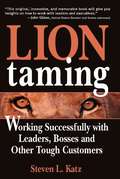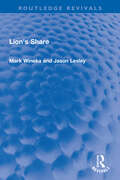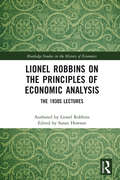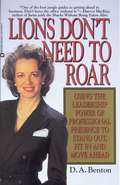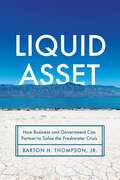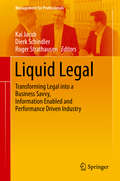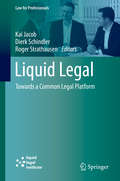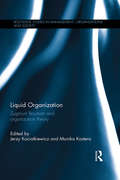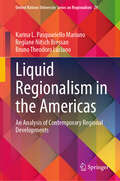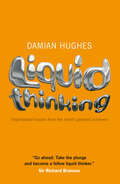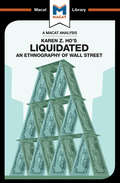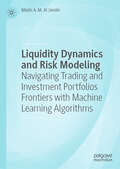- Table View
- List View
Linking the Balanced Scorecard Measures to Your Strategy
by Robert S. Kaplan David P. NortonThe objective of any measurement system should be to motivate all managers and employees to successfully implement the business unit's strategy. Those companies that can translate their strategy into their measurement system are far better able to execute their strategy because they can communicate their objectives and targets. This chapter focuses on the importance of developing a Balanced Scorecard that communicates strategy through an integrated set of financial and nonfinancial measurements. This chapter was originally published as chapter 7 of "The Balanced Scorecard: Translating Strategy into Action."
Linking: Leveraging Practical Knowledge--From Mass Production to Process Enhancement
by Bart Victor Andrew C. BoyntonWorkers who master their jobs generate valuable knowledge for process innovation. Linking enables a firm to capture this knowledge and use it for process enhancement. It also creates a work environment that fosters process innovation knowledge without disrupting efficient production processes.
Linux vs. Windows
by Ramon Casadesus-Masanell Jordan MitchellAs of 2006, Microsoft is finding that their dominant position in client and server operating systems is under attack from Linux. While Linux has only 3% of the worldwide installed base of PC operating systems, it had captured 20% of the server market by the end of 2005 and was quickly becoming a formidable alternative for productivity programs with OpenOffice. Linux's "business model" to compete against Microsoft is significantly different than those of traditional for-profit software companies. Linux is open source (all code is made available for redistribution by anyone) and harnesses the collective power of thousands of programmers--both independent and employees of major software firms such as IBM, HP, Intel, Sun, and Dell--which allows it to work out bugs quickly and release new operating systems several times per year. Students are faced with the analysis of competitive interaction between Windows' and Linux's business models and value loops and are asked to reason whether a clear winner will emerge.
Lion Capital and the Blackstone Group: The Orangina Deal
by Josh Lerner G. Felda Hardymon Ann LeamonThe managing partners of two private equity firms are hoping to forestall a third bidding round for a target company, the European beverage division of Cadbury Schweppes. As they wait to meet with the CEO, they revisit their assumptions on the deal and review the insights that informed their valuation.
Lion Taming
by Steven KatzVisit www.liontaming.com for more information! "This original, innovative and memorable book that will give you insights on how to work with leaders and executives." --John Glenn, United States Senator and former astronautDo you feel that you need a whip and a chair to work effectively with your boss, client, customers, or others? You know the dangers-a growl if you throw them a compliment and a roar if you ever look for thanks!Lions are the people in all organizations who wield power and influence. They act differently because they think differently. But that doesn't mean that they have to be difficulty to work with! Lion Taming will help you get inside their minds, so you can communicate and work more effectively together.Based on in-depth interviews and research into real lion tamers as well as the experiences of numerous people at all levels of the workplace, Steven L Katz shows how the secrets of the center ring can lead to a great performance in the office. Prey, the Enemy or Ignored: Lions make an instinctive calculation the minute any living thing comes into view: You are either prey, the enemy, or ignored. Lion Taming shows you how to avoid all three of these and earn a place in the pride.The Lion's Four Senses: Every lion in the workplace views things through four senses: Dominance, Territory, Social Standing, and Survival. Understanding these senses, and how to make use of them, will give you a leg up in working with your lion.Sticking Your Head in the Lion's Mouth: Lion Taming shows you how people stick their heads into the lion's mouth in the office, why it shouldn't be done, and how to avoid it yourself.Lion Taming Is Really Lion Teaming!: Ultimately, the purpose of lion taming is not just to survive. Lion tamers and lions work together to achieve something that neither could achieve alone. Together, you can leap through the hoop of fire!Lion Taming also contains more than 75 secrets of the lions tamers and numerous strategies for working with the lions in your workplace, such as:o Approaching the lions so the lions will approach youo Closing the gap between attention getting and attention usingo Establishing trust and rapporto Building the Lion Team in your office! Lion Taming is the ultimate guide to everyone's "real" job: working successfully and achieving results with leaders, bosses, and other tough customers!LION TAMING HAS THE STRATEGIES AND SECRETS YOU NEED TO:o Establish your presence, authenticity and credibility in the eyes of leaders, bosses, and other tough customerso Identify the lions around you, and separate the good ones from the bad oneso Get inside the lion's skull by learning about The Lion's Four Senses and The Lion's Instinctive Identity o Decode the lion's social worlds: the hierarchy and the prideo Avoid being the prey, enemy or ignored, and become a very influential member of the pride or organization!
Lion's Share (Routledge Revivals)
by Mark Wineka Jason LesleyFirst published in 1991, Lion’s Share traces the journey made by Ralph Ketner, his brother Brown, and their friend Wilson Smith as they progressed from opening their first supermarket, Food Town, to running more than 800 stores as part of the Food Lion supermarket chain. The book explores the growth of Food Lion and the reasons for its success, using interviews with the company’s founders and top executives, both those present at the time of publication and previous position holders, to provide a detailed account of its history and development.
Lionel Robbins
by Susan HowsonBy the time of his death the English economist Lionel Robbins (1898-1984) was celebrated as a 'renaissance man'. He made major contributions to his own academic discipline and applied his skills as an economist not only to practical problems of economic policy - with conspicuous success when he served as head of the economists advising the wartime coalition government of Winston Churchill in 1940-45 - and of higher education - the 'Robbins Report' of 1963 - but also to the administration of the visual and performing arts that he loved deeply. He was devoted to the London School of Economics, from his time as an undergraduate following active service as an artillery officer on the Western Front in 1917-18, through his years as Professor of Economics (1929-62), and his stint as chairman of the governors during the 'troubles' of the late 1960s. This comprehensive biography, based on his personal and professional correspondence and other papers, covers all these many and varied activities.
Lionel Robbins on the Principles of Economic Analysis: The 1930s Lectures (Routledge Studies in the History of Economics)
by Lionel RobbinsLionel Robbins (1898–1984) is best known to economists for his Essay on the Nature and Significance of Economic Science (1932 and 1935). To the wider public he is well known for the 'Robbins Report' of the 1960s on Higher Education, which recommended a major expansion of university education in Britain. However, throughout his academic career – at Oxford and the London School of Economics in the 1920s, and as Professor of Economics at the School from 1929 to 1961 – he was renowned as an exceptionally gifted teacher. Generations of students remember his lectures for their clarity and comprehensiveness and for his infectious enthusiasm for his subject. <P><P> Besides his famous graduate seminar his most important and influential courses at LSE were the Principles of Economic Analysis, which he gave in the 1930s and again in the late 1940s and 1950s, as well as the History of Economic Thought, from 1953 until long after his official retirement. This book publishes for the first time the manuscript notes Robbins used for his lectures on the Principles of Economic Analysis from 1929/30 to 1934/40. At the outset of his career he took the advice of a senior colleague to prepare his lectures by writing them out fully before he presented them; the full notes for most of his pre-war lectures survive and are eminently decipherable. <P><P> Since he made two major revisions of the lectures in the 1930s the Principles notes show both the development of his own thought and the way he incorporated the major theoretical innovations made by younger economists at LSE, such as John Hicks and Nicholas Kaldor, or elsewhere, notably Joan Robinson. He intended to turn his lecture notes into a book, abandoning the project only when he was asked to chair the Committee on Higher Education in 1960. This volume is not exactly the book he wanted to write, but it is a unique record of what was taught to senior undergraduate and graduate economists in those 'years of high theory'. It will be of interest to all economists interested in the development of economics in the twentieth century.
Lions Don't Need to Roar: Using the Leadership Power of Professional Presence to Stand Out, Fit in and Move Ahead
by D. A. BentonA guide to creating and maintaining a good impression.
Lipman: Vertical Integration in Fresh Tomatoes
by Carin-Isabel Knoop Jose B. AlvarezLipman, the largest open field fresh tomato grower and marketer in the United States, has been successfully pursuing an aggressive strategy of acquisitions over the last several years. End market consolidation in the retail space has driven vertical integration in the extremely competitive fresh tomato business, where farm gate prices have not changed in 30 years. The company is facing pressure from climate change, alternative uses for farm land, and a transition to the next generation of family ownership of the business.
Lipman: Vertical Integration in Fresh Tomatoes
by Carin-Isabel Knoop Jose B. AlvarezLipman, the largest open field fresh tomato grower and marketer in the United States, has been successfully pursuing an aggressive strategy of acquisitions over the last several years. End market consolidation in the retail space has driven vertical integration in the extremely competitive fresh tomato business, where farm gate prices have not changed in 30 years. The company is facing pressure from climate change, alternative uses for farm land, and a transition to the next generation of family ownership of the business.
Lipstick on a Pig
by Torie ClarkeTorie Clarke, renowned and respected in political and business circles as one of the nation's most gifted communicators, offers a complete guide to the new age of transparency. Clarke's message is refreshing and straightforward: No more spin. Always a dubious proposition, spin has become increasingly vulnerable as information sources have proliferated; spin is simply no longer viable. Or put another way, "You can put lipstick on a pig, but it's still a pig." Distilling her twenty-five years of experience and wisdom into eight concise rules, Clarke counsels that politicians and executives need to tell the truth early, often, and in plain language. Clarke's experience is incomparable: She was the Pentagon's communications chief during the early years of George W. Bush's presidency and, prior to that, a high-ranking adviser to the first President Bush and to Senator John McCain. She illustrates her lessons with riveting behind-the-scenes accounts of some of our country's crucial moments over the last two decades -- for instance, as Assistant Secretary of Defense for Public Affairs under Defense Secretary Donald Rumsfeld, she was at the Pentagon on September 11, 2001, and she recounts her experience that day as Rumsfeld's office strove to inform, instruct, and reassure the public. Clarke shows that a policy of transparency not only protects you, but that you even stand to gain from it -- because once you figure out that you can't put lipstick on a pig, you've actually learned something far more powerful: not to create a pig in the first place. Her lessons for getting your message out include: Tell your own story -- especially if it's bad news -- on your own terms, before someone else tells it on theirs. It will allow you to survive controversy and will also enhance your reputation. It's about one thing. Be ready and able to explain yourself to the proverbial man on the street in a clear, simple sentence or two. Admit your mistakes, because the truth will out. Entertaining, approachable, and full of crucial insight and practical guidance, Lipstick on a Pig will be indispensable for business leaders, public figures, and anyone working in media relations. With humor and savvy, Clarke's vision offers truly new opportunities for communications in the Information Age.
Liquid Asset: How Business and Government Can Partner to Solve the Freshwater Crisis
by Barton H. Thompson Jr.A sweeping, policy-oriented account of the private and public management of the world's essential natural resource. Governments dominated water management throughout the twentieth century. Tasked with ensuring a public supply of clean, safe, reliable, and affordable water, governmental agencies controlled water administration in most of the world. They built the dams, reservoirs, and aqueducts that store water when available and move that water to areas with increasing populations and economies. Private businesses sometimes played a part in managing water, but typically in a supporting position as consultants or contractors. Today, given the global need for innovative new technologies, institutions, and financing to solve the freshwater crisis, private businesses and markets are playing a rapidly expanding role, bringing both new approaches and new challenges to a historically public field. In Liquid Asset, Barton H. Thompson, Jr. examines the growing position of the private sector in the "business of water." Thompson seeks to understand the private sector's involvement in meeting the water needs of both humans and the environment, looks at the potential risks that growing private involvement poses to the public interest in water, and considers the obstacles that private organizations face in trying to participate in a traditionally governmental sector. Thompson provides a richly detailed analysis to foster both improved public policy and responsible business behavior. As the book demonstrates, the story of private businesses and water offers a window into the serious challenges facing freshwater today, and their potential solutions.
Liquid Biofuels: Bioethanol (Biofuel and Biorefinery Technologies #12)
by Carlos Ricardo Soccol Gonçalo Amarante Guimarães Pereira Claude-Gilles Dussap Luciana Porto de Souza VandenbergheThis book covers the present and future of bioethanol biorefinery technologies. It discusses the efficient use of feedstock in bioethanol production, and critically reviews the environmental sustainability of bioethanol production. In addition, it describes the integrated production of bioelectricity, biopolymers, organic acids, and other biomolecules, as well as the use of process-related liquid and solid byproducts and/or wastes during bioethanol generation.Since the bioethanol industry has also led the automotive industry to explore new avenues, this book summarizes the various aspects of ethanol motorization, hybrid engine development, and biofuel electrification. For decades, clean and renewable alternatives have been sought to reduce dependence on petroleum-based fossil fuels and CO2 emissions. Bioethanol appears as one of the best solutions for the production of biofuels, bioenergy and biochemicals, along with the establishment of new biorefinery concepts and a circular bioeconomy. Therefore, the ideas and technologies presented in this book contribute to the UN Sustainable Development Goal 7: Affordable and Clean Energy.This book is a useful reference for postgraduate students and researchers interested in biorefinery and biofuel technologies, both in academia- and commercial laboratories. Early career scientists can use it to fast track into the field. Advanced scientists will find it helpful to gain a broader overview of the field beyond their area of specialization.
Liquid Lean: Developing Lean Culture in the Process Industries
by Raymond C. FloydWhile Lean practices have been successfully implemented into the process industry with excellent results for over 20 years (including the author‘s own award winning example at Exxon Chemical), that industry has been especially slow in adopting Lean. Part of the problem is that the process industry needs its own version of Lean. The larger part of t
Liquid Legal
by Roger Strathausen Kai Jacob Dierk SchindlerThis book compels the legal profession to question its current identity and to aspire to become a strategic partner for corporate executives, clients and stakeholders, transforming legal into a function that creates incremental value. It provides a uniquely broad range of forward-looking perspectives from several different key-players in the legal industry: in-house legal, law firms, LPO's, legal tech, HR, associations and academia. This publication is a platform for leading legal professionals that offers a new perspective on the accelerating transformation in legal. Combining expert contributions with editorial insights, it argues that the new legal function will shift from a paradigm of security to one of opportunity; that future corporate lawyers will no longer primarily be negotiators, litigators and administrators, but that instead they will be coaches, arbiters and intrapreneurs; that legal knowledge and data-based services will become a commodity; and that analytics and measurement will be key drivers of the future of the profession. A must-read for all legal professionals, this book sets the course for revitalizing the profession.
Liquid Legal – Humanization and the Law (Law for Professionals)
by Roger Strathausen Kai Jacob Dierk Schindler Bernhard Waltl“Humanization and the Law” combines two current and complementary trends in the business-to-business (B2B) market of the legal industry: digitalization and humanization. On the one hand, digital transformation in corporate legal departments and law firms continues to advance. Contract management, e-discovery, due diligence, legal operations, and forensic data analysis are just a few examples of task areas where the use of intelligent software solutions minimizes legal risks and increases compliance, enables efficiency gains and cost reductions through automation, and allows faster and more agile responses to changing market demands and client expectations. On the other hand, the increasing number of failed digitalization projects shows that technology alone is not enough to successfully transform legal departments and law firms. Software solutions must be integrated into existing work processes, be easy to use, and provide real benefits in order to be accepted by employees. People and their ability to make decisions and lead others remain the focus in an increasingly digitalized legal industry. More than 20 authors provide insights into why human aspects matter for business, what organizations can do to increase the mental well-being and motivation of their employees, and how to prevail in the upcoming war for talent in the legal industry. “The legal industry has been largely dismissive of “soft skills” and “humanizing law.” One of the paradoxes of our time is that the ascendency of automation, artificial intelligence, blockchain, Big Data, and other technological platforms has elevated, not diminished, the importance of humanity. It is not only what distinguishes us from machines but it also enables us to apply our humanity to machines. The legal function will play an important role in this process but must first take a hard look at itself.” (Mark A. Cohen, in “Foreword”)
Liquid Legal: Towards a Common Legal Platform (Law for Professionals)
by Roger Strathausen Kai Jacob Dierk SchindlerThree years ago, the first Liquid Legal book compelled the legal profession to reassess its identity and to aspire to become a strategic partner for corporate executives as well as for clients. It also led to the foundation of the Liquid Legal Institute (LLI) – an association that sparks innovation and drives collaboration in the legal industry. This second Liquid Legal book builds on the LLI’s progress and on the lessons learned by a legal community that has moved beyond focusing purely on LegalTech. It not only presents an outlook on how legal professionals will operate in the future, but also allows readers to develop a genuine understanding of the value of digitalization, standardization and new methodologies. Further, the book outlines a Common Legal Platform (CLP) and makes it the common point of departure for every author, offering inspiring insights from a wide range of forward-thinking experts who are all invested in driving new thinking within the legal ecosystem. The book also features “Liquid Legal Waves,” which provide links between the various articles, connecting concrete ideas, practical solutions and specific topics and putting them into perspective, and so creating a true network of ideas for readers. A must read, this book is vibrant proof of the power of sharing, collaboration and coopetition, helping the legal profession to shape its digital future and revitalize its relevance while retaining a focus on the human lawyer.
Liquid Legal: Transforming Legal Into A Business Savvy, Information Enabled And Performance Driven Industry (Management For Professionals Series)
by Roger Strathausen Kai Jacob Dierk SchindlerThree years ago, the first Liquid Legal book compelled the legal profession to reassess its identity and to aspire to become a strategic partner for corporate executives as well as for clients. It also led to the foundation of the Liquid Legal Institute (LLI) – an association that sparks innovation and drives collaboration in the legal industry. This second Liquid Legal book builds on the LLI’s progress and on the lessons learned by a legal community that has moved beyond focusing purely on LegalTech. It not only presents an outlook on how legal professionals will operate in the future, but also allows readers to develop a genuine understanding of the value of digitalization, standardization and new methodologies. Further, the book outlines a Common Legal Platform (CLP) and makes it the common point of departure for every author, offering inspiring insights from a wide range of forward-thinking experts who are all invested in driving new thinking within the legal ecosystem. The book also features “Liquid Legal Waves,” which provide links between the various articles, connecting concrete ideas, practical solutions and specific topics and putting them into perspective, and so creating a true network of ideas for readers. A must read, this book is vibrant proof of the power of sharing, collaboration and coopetition, helping the legal profession to shape its digital future and revitalize its relevance while retaining a focus on the human lawyer.
Liquid Organization: Zygmunt Bauman and Organization Theory (Routledge Studies in Management, Organizations and Society)
by Monika Kostera Jerzy KociatkiewiczWidely known as a leading intellectual, Zygmunt Bauman’s thinking is often categorized as sociology or philosophy. But his work has been hugely influential in other fields as well, not least within organization studies. From increasing management control and growing standardization of work activities, to the increase in uncertainty and insecurity experienced by contemporary workers, organizations themselves are becoming ever more ephemeral entities. Bauman’s themes: globalization, liquid modernity and postmodern ethics are arguably fundamental to contemporary notions of organization and management and his thinking has never been more relevant. However, despite the obvious and continuing influence of Bauman’s ideas on business studies, there has been no comprehensive attempt to chart his impact on organization theory. In this innovative and insightful collection, an international selection of leading management scholars explore key topics in current organizational discourse, including networked organizations, control and ambiguity, technologies, work and responsibility, extending Bauman’s liquid modernity to the "liquid organization". The book will be essential reading for scholars and academics and students in management and organizational theory, and also sociology, managing culture and organizational ethnography.
Liquid Regionalism in the Americas: An Analysis of Contemporary Regional Developments (United Nations University Series on Regionalism #29)
by Karina L. Pasquariello Mariano Regiane Nitsch Bressan Bruno Theodoro LucianoThis book develops a comprehensive analysis of contemporary regionalism in the Americas, which the authors characterise as Liquid Regionalism, given its unstable, flexible and loose characteristics. It innovates by introducing a new concept to assess regional initiatives in the American continents, contributing to Latin American and comparative regionalism research agendas. The book analyses major regional projects in the Americas and develops these into a novel typology of consultation, cooperation and integration. This typology helps explain the level of commitments and institutional depth of regional initiatives across the continent. The book is for scholars, postgraduate and undergraduate students interested in the regional and political dynamics of the Americas across the social sciences, including international relations, political science, sociology, international political economy, international trade, and history.
Liquid Thinking: Inspirational lessons from the world's great achievers
by Damian HughesStuck in a rut? Know what you want but don't know how to get it? Feel like life is passing you by? Sick of getting mediocre results? Then enter the wonderful world of Liquid Thinking... A practical, jargon-free and easily accessible self-help book drawing on a diverse range of experiences and containing digestible lessons and exercises used by sports captains, charity leaders and business leaders. It is the only self-help book which has ever been endorsed by Sir Richard Branson, Angelo Dundee, Muhammad Ali, and Jonny Wilkinson. It is a brave man who starts his book on self development by quoting Jerry Springer and discussing the literary merits of the Joy of Sex; however, this is Damian Hughes to a tee. Combining his own experiences as a Manchester United football coach, HR Director and youth club leader with exclusive insights from Sir Richard Branson, Angelo Dundee, Muhammad Ali and Jonny Wilkinson, Hughes will help you to step forward to achieve your own special hopes, dreams and ambition. The books have been credited with helping people build their own houses, fight cancer and run marathons, so come on and be a fellow Liquid Thinker!
Liquidated: An Ethnography of Wall Street
by Karen HoFinancial collapses--whether of the junk bond market, the Internet bubble, or the highly leveraged housing market--are often explained as the inevitable result of market cycles: What goes up must come down. In Liquidated, Karen Ho punctures the aura of the abstract, all-powerful market to show how financial markets, and particularly booms and busts, are constructed. Through an in-depth investigation into the everyday experiences and ideologies of Wall Street investment bankers, Ho describes how a financially dominant but highly unstable market system is understood, justified, and produced through the restructuring of corporations and the larger economy. Ho, who worked at an investment bank herself, argues that bankers' approaches to financial markets and corporate America are inseparable from the structures and strategies of their workplaces. Her ethnographic analysis of those workplaces is filled with the voices of stressed first-year associates, overworked and alienated analysts, undergraduates eager to be hired, and seasoned managing directors. Recruited from elite universities as "the best and the brightest," investment bankers are socialized into a world of high risk and high reward. They are paid handsomely, with the understanding that they may be let go at any time. Their workplace culture and networks of privilege create the perception that job insecurity builds character, and employee liquidity results in smart, efficient business. Based on this culture of liquidity and compensation practices tied to profligate deal-making, Wall Street investment bankers reshape corporate America in their own image. Their mission is the creation of shareholder value, but Ho demonstrates that their practices and assumptions often produce crises instead. By connecting the values and actions of investment bankers to the construction of markets and the restructuring of U. S. corporations, Liquidated reveals the particular culture of Wall Street often obscured by triumphalist readings of capitalist globalization.
Liquidated: An Ethnography of Wall Street
by Rodolfo MaggioLiquidated is a work of anthropology that treats an unusual, despised subculture – that of the Wall Street banker – much as anthropologists have traditionally treated remote ‘savage’ tribes. But using the techniques of ethnography, including interviews, analysis of daily lives, and fieldwork to investigate a modern western culture is not original; what sets Ho's work apart and gives it value is her mastery of the critical thinking skills of problem-solving and creative thinking to reconceptualize the way in which we understand the bankers' mindset. Ho's great achievement is to ask productive questions, most obviously in drawing a distinction between bankers' self-image as capitalist warriors, freeing up value for themselves and shareholders by increasing the liquidity of the assets they invest in, and the social consequences of what they do. As Ho points out, not only is Wall Street institutionally inclined to embrace risk, in order to maximise profit; it is also prone to assume that increased liquidity (most often achieved by breaking up and selling off the parts of a large corporation) is a good in itself, irrespective of the outcomes for the workers actually involved in these disposals. Considering alternative possibilities, and generating fresh solutions, Ho determines that the capitalist principles that underpin Wall Street are myths, not the expression of some natural economic law..
Liquidity Dynamics and Risk Modeling: Navigating Trading and Investment Portfolios Frontiers with Machine Learning Algorithms
by Mazin A. Al JanabiThis book presents a high-quality contribution to the applications of modern financial algorithms for liquidity risk management and its practical uses and applications to investable portfolios and mutual funds. It brings together the latest thinking on the emerging topic of contemporary liquidity risk estimations and management and includes principles, reviews, examples, and concrete financial markets applications to trading and investment portfolios. Furthermore, it explores research directions of liquidity risk management using modified Liquidity-Adjusted Value-at-Risk (L-VaR) models with the application of machine learning optimization algorithms. The book presents specific self-contained use-cases throughout, showing practical applications of the concepts discussed and providing further directions for researchers and financial markets participants. The book draws practical insights from personal experiences and applies specific examples (with the use of real-world case studies and analysis) about how the modeling techniques and machine learning optimization algorithms could address specific theoretical and practical issues of liquidity risk management and coherent asset allocation in trading and investment portfolios. It will be of interest to researchers, students, and practitioners of risk management, portfolio management, and machine learning.

